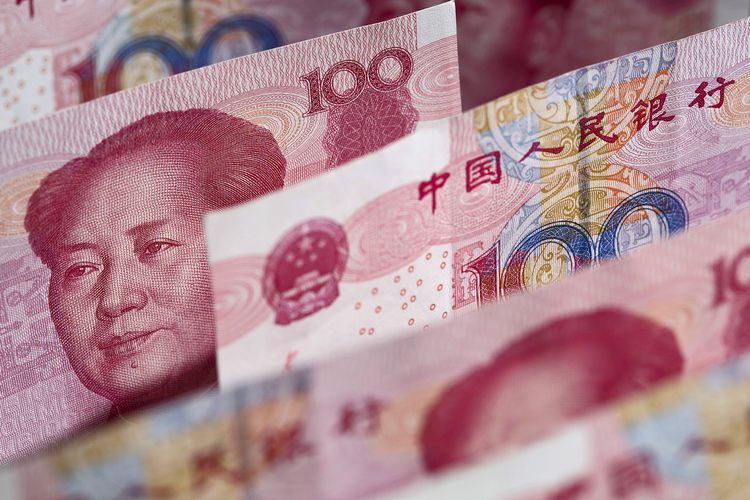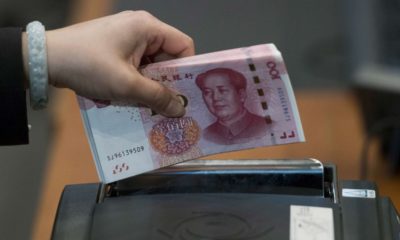- China Sets Biggest One-day Yuan Rate Increase Since 2005
China on Friday (Jan 6) raised the exchange rate for the yuan against the US dollar by 0.92 per cent from the previous day, the biggest one-day increase in more than 11 years.
The People’s Bank of China (PBOC), which has been battling to shore up the sagging yuan, fixed it at 6.8668 to the greenback, according to the China Foreign Exchange Trade System, which operates the national foreign exchange market.
That marked the strongest daily increase since July 2005, and comes as the yuan had flirted lately with the 7.0 to the dollar mark, a threshold not crossed in more than eight years.
China only allows the tightly controlled yuan to rise or fall two per cent on either side of the daily fix, to prevent volatility and maintain control over the currency.
This came a day after the yuan scored its biggest-ever two-day gain against the dollar as Beijing cracked down to bets against its currency ahead of US president-elect Donald Trump’s inauguration on Jan 20.
China’s currency has been under pressure from uncertainty over the health of the world’s second largest economy, massive capital outflows and the sharp rise in the US dollar following Trump’s election victory and anticipation of US interest rate hikes.
The PBOC has plenty of reasons to give the yuan some short-term support. Trump has pledged to label the country a currency manipulator on his first day in office, while the exchange rate came close to breaking through the psychologically-important level of 7 per dollar earlier this week. Policy makers also want to avoid a flood of capital outflows as citizens’ annual foreign-exchange quotas reset for the new year.
China said last week it would almost double the number of foreign currencies it uses to determine the official value of the yuan, thereby diluting the role of the dollar as authorities seek to arrest the yuan’s fall and project an image of stability in the unit.
On Thursday, the PBOC clamped down on yuan borrowing in Hong Kong by instructing its banks to withhold funds from other banks, a move which sent overnight interbank interest rates soaring to 38 per cent from 17 per cent, the highest in a year, the Wall Street Journal reported.
The yuan in offshore trading in Hong Kong jumped 1.2 per cent on Thursday for a two-day gain of 2.5 per cent. The onshore yuan gained 0.7 per cent to 6.8830 per dollar in Shanghai.
The record two-day rally offshore revived memories of an epic squeeze last January for bearish traders. The abrupt market reversal almost exactly a year ago marked the beginning of a nearly 5 per cent rally that lasted two months.
“Another extraordinary day in China,” said Gareth Berry, a foreign-exchange and rates strategist at Macquarie Bank in Singapore. “It looks like a classic case of a consensus trade blowing up at the start of a new year.”
The turbulence represents the latest twist in a battle between China bears – who say slowing economic growth makes a devaluation inevitable – and policy makers fearing a sudden drop will destabilize the financial system. Pessimists have mostly been on the right side of the trade since a one-time exchange rate adjustment in August 2015, but sudden bouts of strength have proven painful for short sellers who need to periodically roll over their bets.
“It’s painful to sit on short yuan positions now, given the soaring funding costs,” said Sim Moh Siong, a currency strategist at Bank of Singapore.
Bloomberg News reported this week that policy makers were encouraging state-owned enterprises to sell foreign currency. National Australia Bank says bears are unlikely to see a major reprieve any time soon as authorities keep tight control of the yuan before this month’s inauguration of US President-elect Donald Trump.
Short squeezes like the one in Hong Kong’s offshore market this week come at a cost. While surging interbank rates help deter bearish speculators, they also undermine China’s push to make the yuan an international reserve currency, said Michael Every, head of financial markets research at Rabobank Group in Hong Kong.
“What’s the point of being a reserve currency and having fought so hard to become a reserve currency, and then not letting anybody get hold of that currency,” he said. “China basically wants to have its cake and eat it on all fronts.”
Analyst estimates compiled by Bloomberg suggest China will eventually let the yuan continue its descent. The exchange rate will fall to 7.15 per dollar by year-end before sliding to 7.3 the following year, according to the median projections.
In the short term, though, the currency is unlikely to be a one-way wager, said Angus To, deputy head of research at ICBC International Research Ltd. in Hong Kong. “After this round of liquidity squeeze, speculators will at least scale down short yuan bets for the next two months,” To said. “We expect the offshore yuan to stabilize at around 6.8 yuan per dollar after the market run.”

 Billionaire Watch3 weeks ago
Billionaire Watch3 weeks ago
 Startups4 weeks ago
Startups4 weeks ago
 News4 weeks ago
News4 weeks ago
 News4 weeks ago
News4 weeks ago
 Bitcoin4 weeks ago
Bitcoin4 weeks ago
 Naira4 weeks ago
Naira4 weeks ago
 Forex3 weeks ago
Forex3 weeks ago
 Treasury Bills4 weeks ago
Treasury Bills4 weeks ago






















